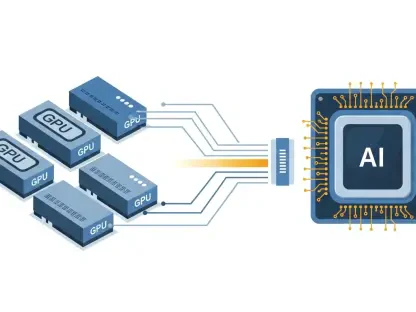The justice system in England and Wales stands on the brink of a technological revolution, with artificial intelligence (AI) poised to redefine how courts, prisons, and probation services operate. Imagine a courtroom where thousands of documents are analyzed in mere hours, or a probation officer freed from tedious paperwork to focus on rehabilitation. This is the vision set forth by the Ministry of Justice (MoJ) through a pioneering AI action plan, backed by the highest levels of government. Spanning a comprehensive three-year strategy, the initiative seeks to tackle long-standing issues like case backlogs and limited access to legal resources by integrating cutting-edge tools into everyday operations. With over 60 projects underway, the plan promises not just efficiency but a fundamental shift in delivering fairness and transparency. As this ambitious journey unfolds, the balance between innovation and ethical responsibility remains a critical focus for all stakeholders involved.
Laying the Groundwork for AI in Justice
Building a Robust Technical Foundation
The foundation of this transformative strategy rests on strengthening the technical infrastructure across the justice system to support AI integration. A key priority is ensuring that courts, prisons, and probation services are equipped with secure, scalable systems capable of handling sophisticated AI tools. The MoJ has established a dedicated Justice AI Unit, spearheaded by a Chief AI Officer, to oversee the seamless rollout of these technologies. This unit is tasked with modernizing outdated systems and fostering strategic partnerships with tech innovators to create customized solutions. Beyond hardware and software upgrades, there’s a significant push to equip all 95,000 justice system staff with secure AI assistants by the end of the current year. Early pilots of these assistants have already shown promising results, saving approximately 30 minutes daily on routine tasks such as drafting reports and scheduling. This time-saving potential could redefine productivity standards across the sector, setting a new benchmark for operational efficiency.
Training and Talent for a Digital Future
Equally crucial to the infrastructure overhaul is the investment in human capital to navigate this digital shift. Recognizing that technology alone cannot drive change, the MoJ has launched the Justice AI Fellowship to attract top-tier AI talent from academia and industry into government roles. This initiative aims to bridge the gap between cutting-edge innovation and practical application within the justice system. Alongside this, comprehensive training programs are being rolled out to ensure staff at all levels are adept at using AI tools responsibly. The focus is not merely on technical skills but also on understanding ethical implications, ensuring that human judgment remains paramount. Collaborative efforts with regulatory bodies like the Solicitors Regulation Authority (SRA) further emphasize a measured approach, embedding best practices from the outset. By prioritizing both talent acquisition and skill development, the strategy seeks to create a workforce ready to harness AI’s potential while safeguarding public trust in the justice process.
Real-World Applications and Ethical Challenges
AI Tools Enhancing Efficiency in Legal Processes
In practical terms, AI is already making waves in the justice system with tools designed to streamline complex processes and alleviate systemic pressures. From AI-powered chatbots providing public assistance to transcription software capturing probation meeting details, these innovations are significantly reducing administrative burdens. A striking example comes from a high-profile criminal trial at the Old Bailey, where advanced software analyzed 10,000 documents, slashing costs by £50,000 and cutting four weeks from the timeline. Similarly, the SRA’s approval of an AI-driven law firm specializing in automated debt recovery highlights how such technology can ease court workloads. These real-world applications demonstrate AI’s capacity to enhance access to justice by speeding up case handling and reducing expenses. As pilot programs expand, the potential for broader implementation offers hope for a more responsive legal framework, capable of addressing long-standing delays with unprecedented efficiency.
Balancing Innovation with Ethical Oversight
Despite the optimism surrounding AI’s capabilities, the ethical dimensions of its adoption cannot be overlooked, as they pose significant challenges to maintaining fairness and trust. The MoJ has made it clear that AI must complement, not replace, human decision-making, particularly in sensitive areas like custody risk assessments. Strict oversight mechanisms and transparency protocols are being prioritized to mitigate risks such as algorithmic bias, which could inadvertently perpetuate inequalities. Critics have also pointed out that without sustained financial backing, scaling successful pilots into system-wide solutions remains uncertain. Infrastructure gaps and funding uncertainties could hinder progress if not addressed proactively. The consensus among stakeholders is that while AI holds immense promise for transforming justice delivery, a cautious, evidence-based approach is essential. This balance between embracing innovation and upholding judicial independence will define the success of these initiatives in the years ahead.
Reflecting on a Bold Step Forward
Lessons from an Ambitious Initiative
Looking back, the rollout of the MoJ’s AI action plan marked a historic turning point for the justice system in England and Wales. It represented a bold commitment to harnessing technology to address deep-rooted inefficiencies and accessibility barriers. The early successes, such as time savings from AI assistants and cost reductions in high-stakes trials, underscored the tangible benefits of this approach. Yet, the journey also revealed critical challenges, from ensuring ethical standards to securing consistent funding for long-term scalability. Each pilot and partnership forged during this period offered valuable insights into how technology could be integrated without compromising fairness. Reflecting on these efforts, it became evident that the path to transformation demanded not just innovation but a steadfast dedication to transparency and human oversight.
Charting the Next Phase of Transformation
As the justice system moved forward from those initial steps, the focus shifted to actionable strategies for sustaining momentum. Expanding the reach of AI tools like transcription software and predictive models required rigorous testing and ethical scrutiny to prevent unintended consequences. Strengthening collaborations with smaller UK tech firms through innovative procurement models proved vital for tailoring solutions to specific needs. Additionally, addressing infrastructure limitations and securing long-term investment emerged as non-negotiable priorities to ensure no region or service was left behind. The lessons learned emphasized the importance of continuous dialogue with regulatory bodies and the public to maintain trust. By building on past achievements and tackling remaining hurdles with precision, the justice system could fully realize AI’s potential, paving the way for a future where efficiency and equity walked hand in hand.









